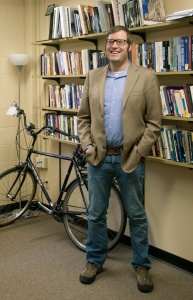
Who I am…
My name is Peter Hossler and I’m Assistant Professor of Urban and Community Health at Rhodes College.
I teach Intro to Urban Studies, Urban Community Health, computer-mapping class–GIS.
I’m teaching a class on the nonprofit sector called Healthy City. It’s looking at the way the nonprofit sector functions towards the construction better of health.
And I teach an urban geography class and that’s really, like, Marxist political urban economy.
I got interested in Marx…
I was trying to finish a degree in outdoor recreation and I took a class that was kind of on Marxist economics and it was the first time that I’d ever thought about poverty and the first time that I’d ever thought about poverty as, like, a logical outcome of a structural system.
It had never occurred to me. I had never probably really thought about poverty, to be honest.
I tell my students that Marx is…
I do a brief thing the first day where I say, look, Marx was a political economist. His theories shine important light on particular things and as they do that, they do great violence to other types of things.
What led me here…
I ran a summer camp in upstate New York for three years and during that time, I spiral fractured my leg.
And I was insured but it was really hard for me to imagine what my life would’ve been like at that moment if I A) wasn’t insured and B) didn’t have upper-middle class parents who could’ve bail me out, you know, because I probably would’ve been OK.
So that really got me interested in healthcare. I decided to quit doing camping and go back to graduate school and study the economics of poverty through a healthcare lens.
How faith plays a role in my work…
I’m not religious in any way, shape or form. I used to be really skeptical of religion entirely but I will say the faith community, I think, is doing most of the important work in any place I’ve ever lived.
So I’m really excited to the degree that there are opportunities to work with the faith communities ‘cause in some ways, I sorta wish I was more religious. I haven’t figured out a way to make that happen.
I define healthcare as…
Healthcare to me would be a set of assets that provide healthy choices, right? That provide you with choices that have positive health outcomes.
One of Memphis’ greatest healthcare challenges is…
It has to do something about the unequal distribution of wealth. Because all the nonprofits in the world are not going to change the fact that people are living so close to the poverty line, which is a total bullshit line.
But what Memphis healthcare is doing right is…
I think there’s a lot of energy around health, which I think is great. I see a lot more discussion of productive partnerships…
The biggest challenge in my healthcare work is…
One challenge, I think, is that in organizations doing the important work have limited capacity to step back and think about their work in a larger framework than just the work itself.
How do we get these really wonderful institutions that are working really hard to think long term?
The greatest reward in my healthcare work is…
I think in my own personal work, I’m a pretty good listener and I take things slow when I move places.
I think all of those allow me to meet with people, talk with people, to gain a better understanding of this thing that I think I want to do something with.
Learn more about Rhodes College.